 |
| 2004 National JROTC Air Rifle Championship Logo |
With calls of “Pull!” and the distinctive clap of shotgun fire on the range next door, and the crack of military rifles in the distance, young shooters from all over the country and one American high school team from Germany converged on Ft. Benning, Georgia’s Pool Range Complex to vie for team and individual honors in the 2nd National JROTC Air Rifle National Championship. Ft. Benning was a busy place during the last week of March; USA Shooting held their final trials for the 2004 Olympic Team in the shotgun events; the Army was conducting its first All-Army Matches in many years and the CMP was hosting the National JROTC Championship. Yes, for shooters, Ft. Benning was an important place to be in March.
For the JROTC competitors, the road to Ft. Benning began in December when Army, Navy and Marine Corps JROTC units all over the country fired their first postal round. Some progressed to shoulder to shoulder qualifiers; others had additional postal competitions to advance to Army, Navy or Marine Corps JROTC qualifying competitions that determined who would represent their branch in the Nationals. When LTC Bob Aylward (USA Ret.), Deputy Commander of the Army Marksmanship Unit, and Gary Anderson, Director of the CMP, officially opened the competition on March 25th, 120 Army, Navy and Marine Corps JROTC cadets who represented 39 different JROTC units from all over the country were present and ready to shoot. The teams that traveled the longest distance were an NJROTC team from Chugiak, Alaska and the Würtzburg American Army JROTC team from Germany.
First day events included check-in, equipment control and inspection, a coaches meeting, plenty of practice, the opening ceremony and a pizza party for all participants. Competition firing took place on the second and third days. All competitors fired a 3X20 course of fire on both days. The top eight individual firers each day qualified for an individual final round of 10 shots standing fired in the Olympic finals format.
On the first day of competition in the sporter category, Alaina Wallace of Winnsboro High School, Louisiana shared the top of the leader board with Andrew Patterson of Clinton High School, South Carolina with scores of 547 each. However, in the final for the day, Wallace fired a 90.9 to Patterson’s 82.7 to take an eight point lead.
The precision category was similarly close. Erin Lorenzen of Concordia Lutheran High School, Indiana who fired a 3X20 score of 583, held a one point margin over Julius Aluyen of Central Catholic High School, Texas. There was a big shift in the standings during the final. James Greene of Shelby County High School, Kentucky surged from fourth place before the final, to first place with his 100.7 performance in the final.
 |
| Alaina Wallace from Winnsboro HS, LA finished as the top Sporter Individual in the 2004 National JROTC Air Rifle Championship with a score of 1177.9. |
On the second day, Alaina Wallace continued her outstanding performance, firing a 544 in the sporter event. The best sporter score of day two, a 546, however, was posted by Tyler Burke of La Cueva High School, New Mexico. The day two sporter final saw another big shift in standings. Joseph Wymer of Clinton, South Carolina finished the first day in 13th place. But he fired a solid 542 day two score and a 90.7 in the second sporter final to jump all the way up to second place overall. Alaina Wallace’s early lead was enough to fend off Wymer’s surge and secure the National JROTC Individual Sporter Championship for the Winnsboro, Louisiana competitor who finished fourth in the 2003 individual sporter championship. Blake Phillips from Bogalusa High School, Louisiana finished the day and the competition in third for the sporter class.
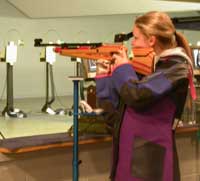 |
| Jennifer Langford of Patuxent HS, MD took the overall Precision Champion with her score of 1261.5. |
In precision event day two competition, Christopher Boggs of Shelby County High School, Kentucky fired the best score of with a 585. Jennifer Lankford of Patuxent High School, Maryland, who had a 583, and the leader after day one, James Greene who fired a 580, followed him. By the end of the second final only 2.3 points separated the first four shooters. After the last shots of the day two final were fired, Jennifer Lankford, a Navy JROTC cadet from Patuxent, Maryland had climbed from fourth place at the end of the first day to win the gold medal and the title of National JROTC Precision Champion. Second place went to Shelby County, Kentucky Marine Corps cadet James Greene, who led the first day’s competition. The next two shooters, Megan Reinking of Concordia Lutheran High School, Indiana and Amber Criss of Walla Walla High School, Washington were tied with identical aggregate scores of 1259.2. Tie breaking is done with a one shot sudden death shoot off. Criss, who is only a freshman, fired first and scored a 9.6. Reinking’s shot quickly followed. It was a 10.6 to give her third place overall in the precision event.
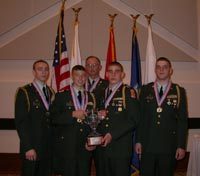 |
| Bogalusa HS Army JROTC won the Sporter Team Championship with a score of 4269. Team members were Blake Phillips, Charles Henley, Tucker Lee and William Cleland. |
In the team championships, decided by the combined aggregate scores of four team members, it was the Bogalusa High School Army JROTC team from Bogalusa, Louisiana that took away the first place trophy in sporter. The Bogalusa team is no stranger to top honors in sporter air rifle. This time they added another major championship trophy to their trophy case with their winning score of 4269 x 4800. The Louisiana team took the lead in the first day’s prone shooting and steadily added to their lead as the two days of competition unfolded. Finishing in second place with a score of 4235 was the Army JROTC team from Clinton High School, South Carolina. Third place was won by the Zion-Benton High School Navy JROTC team from Illinois, with their score of 4170.
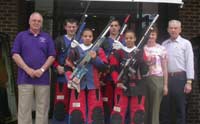 |
| Wurtzburg American Hs, Germany finished 23 points behind Shelby County to earn second place overall Precision Team. |
The precision team event was a vindication of sorts for one team. The Army JROTC team from Würtzburg American High School in Germany qualified for the 2003 Nationals, but finished in last place with a two-day score of 4334. But rather than being discouraged by their 2003 finish, it motivated the team to train much harder throughout the next year. Their efforts paid off. When this year’s competition was over, the Würtzburg team improved 231 points over their 2003 score finished in second place overall with a score of 4565. That’s an improvement of almost 58 points per shooter in one year’s time!
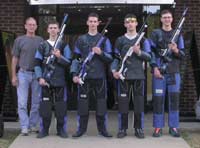 |
| Shelby County High School Marine Corps JROTC team from Shelbyville, Kentucky won the Precision Team Championship with a score of 4588. Team members were Christopher Boggs, James Greene, Coty Brewer and William Law. |
In fact, the Würtzburg team almost won it all. After the first day, they led the defending champions, the Marine Corps JROTC team from Shelby County High School, Kentucky by one point 2294 to 2293. The Shelby County team posted a a strong 2295 on the second day and took over the lead with their team aggregate score of 4588 to earn the title of 2004 National JROTC Precision Team Champions. Two Shelby County shooters, Christopher Boggs and James Greene, overcame hours of last minute travel to help boost their team to champion status. Boggs and Greene were participating in the Junior Olympic Nationals in Colorado Springs in the days prior to the JROTC Nationals. They finished the competition there on training day of the JROTC championship and in order to get from there to Fort Benning, had to fly west to Las Vegas where they caught a redeye flight to Atlanta on the morning of the first day of competition at Ft. Benning. By the second day, they were recovered and Boggs led all firers with his 585 score.
Third place in the team event was awarded to the Army JROTC team from Central Catholic High School, Texas for their 4555 aggregate score performance in this year’s Nationals.
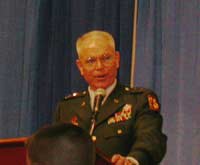 |
| Guest speaker for the 2004 National JROTC Championship banquet was Major General Allen Thrasher, Commanding General fo the Army Cadet Command. |
Major General Allen Thrasher, Commanding General of the Army Cadet Command, visited the Pool Complex range on the second day where he was able to witness both finals and congratulate the winners. General Thrasher was the guest speaker at the awards banquet that evening.
He spoke about how his work with JROTC cadets and instructors has made his
command "the best job in the world." He participated in the
award presentations where he awarded trophies and medals to the overall
championship and runner-up teams in the sporter and precision classes.
For more complete information about scores and standings for this year’s JROTC National Championships, be sure to go to the CMP website where complete breakdowns of each day’s scoring is available. |






